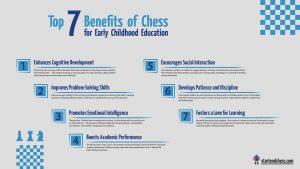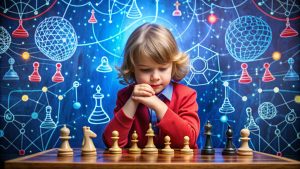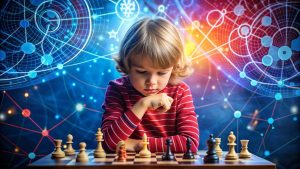Top 7 Benefits of Chess for Early Childhood Education
Chess for Early Childhood Education is emerging as a transformative tool in the world of learning. While chess has long been celebrated for its strategic depth and intellectual challenge, its benefits for young children are only beginning to be fully appreciated. Integrating chess into early childhood education goes beyond teaching a game; it introduces children to a world of cognitive development, emotional growth, and social interaction that sets the foundation for lifelong success.
In a time when educators and parents are constantly searching for effective methods to enhance early learning, chess offers a unique blend of fun and educational value. The structured yet creative nature of chess helps young minds develop critical thinking, improve concentration, and build problem-solving skills. Moreover, the game fosters emotional intelligence, patience, and discipline—qualities essential for both academic achievement and personal growth. This article will delve into the top 7 benefits of chess for early childhood education, revealing why this ancient game is a modern-day powerhouse for developing young minds.
- What are the benefits of teaching chess to young children?Teaching chess to young children offers numerous benefits, including enhanced cognitive development, improved problem-solving skills, increased emotional intelligence, better academic performance, and the development of patience and discipline. Chess also encourages social interaction and fosters a love for learning.
- Is chess a good tool for social interaction in early childhood education?Absolutely. Chess encourages social interaction by requiring children to communicate, collaborate, and engage with peers. It teaches them valuable social skills like teamwork, respect for others, and good sportsmanship.
- How can I encourage my child to take an interest in chess?You can encourage your child to take an interest in chess by making the game fun and engaging. Start with simple lessons, play together, and celebrate their progress. Introducing chess-themed stories, puzzles, and games can also spark their curiosity and motivation to learn.

-
Enhances Cognitive Development
Chess enhances cognitive development in a very young child by involving the child in highly complicated mental processes. As children play chess, they actually exercise their brains toward intellectual growth. Children need to memorize rules, strategies, and also anticipate some of the moves. This kind of mental exercise strengthens memory, enhances logical reasoning, and improves focus. The cognitive skills developed through the game have evident benefits that far transcend the chessboard, enhancing abilities to learn and be successful in many academic disciplines, with emphasis on those that include critical thinking and analytical skills.
When children engage in chess, they practice:
- Memory Enhancement: Remembering moves, strategies, and rules boosts memory retention.
- Logical Thinking: Analyzing different possibilities encourages logical reasoning.
- Concentration: Focusing on the game enhances attention span and concentration levels.
These skills are foundational in early childhood and can positively influence academic performance across subjects like math, science, and reading.
-
Improves Problem-Solving Skills
One of the root elements of chess is problem-solving. Every move on the chessboard poses a problem begging for thoughtful analysis and a strategic response. While playing chess, children learn to estimate various situations, balance potential outcomes, and make decisions according to their predictions. The constant activity of solving problems helps them develop the skill of thinking ahead and being prepared for challenges, not only in the game but in real life too. The creativity required to find a way out of complex situations in chess encourages children to look at problems from different perspectives and so enhances creative thinking.
This process nurtures critical problem-solving abilities by:
- Encouraging Forward Thinking: Children learn to think several steps ahead, considering the consequences of their actions.
- Fostering Creativity: Chess encourages creative solutions to overcome challenges on the board.
- Building Resilience: When a strategy fails, children learn to adapt and try new approaches.
These problem-solving skills extend beyond the game, helping children navigate challenges in their daily lives.

-
Promotes Emotional Intelligence
Chess will help your child develop relevant emotional skills as they play. The game naturally exposes your child to situations where they have to handle winning and losing, hence developing resilience and sportsmanship. A child learns patience by waiting for the opponent’s move and self-control in resisting impulsive actions. Chess also enhances empathy since players must project their opponents’ strategies, and doing so requires understanding another person’s perspective. These emotional intelligence skills are quite instrumental in developing healthy relationships and long-term success in life.
Key emotional skills developed through chess include:
- Patience: Learning to wait for the right moment to make a move fosters patience.
- Self-Control: Children must control impulses and think carefully before acting.
- Empathy: Understanding an opponent’s perspective and anticipating their moves enhances empathy.
Developing emotional intelligence at a young age can lead to better interpersonal relationships and emotional resilience later in life.
-
Boosts Academic Performance
Chess and improved academic performance go hand in hand. Indeed, the mental discipline and strategic thinking that arise from chess playing explicitly transfer into the classroom. Mathematically, children who play chess have an enhanced ability because of emphasis on patterns and sequences of spatial reasoning. Moreover, skills required to understand and follow complex sequences in chess can translate to better reading comprehension. Furthermore, this game improves the student’s executive functions in planning, organization, and execution, which the latter will greatly help the child in many other subjects at school.
Specifically, chess has been linked to:
- Better Math Skills: The strategic and spatial reasoning required in chess enhances mathematical thinking.
- Improved Reading Comprehension: The ability to anticipate and understand complex sequences of events in chess can translate to better reading comprehension.
- Enhanced Executive Function: The mental discipline required in chess supports executive functions like planning, organizing, and executing tasks.
Integrating chess into the curriculum can thus provide a strong foundation for academic excellence.

-
Encourages Social Interaction
Chess is a game that involves much social activity, mostly in pairs or small groups, hence offering multiple opportunities for socialization. They learn to communicate effectively by discussing strategies and explaining one’s move to the other, in a spirit of friendly competition. Teaming up while playing chess allows children to share ideas and learn from one another. It also conveys respect for others through rules of the game and good sportsmanship in winning or losing. These social skills are what bind kids together to really develop friendships and work collaboratively in school and beyond.
Through chess, children learn:
- Communication Skills: Discussing strategies and moves improves verbal communication.
- Teamwork: In group settings, children can collaborate, share ideas, and learn from one another.
- Respect: Chess teaches respect for opponents, rules, and fair play.
These social skills are crucial for building healthy relationships and developing a sense of community.
-
Develops Patience and Discipline
Chess is a game that requires more than anything else patience and discipline. These are very important virtues if one wants to be successful both in personal and academic life. The child learns the virtue of waiting for the appropriate time to make a move, which inculcates delayed gratification. Chess also allows goal-oriented behavior in that children can set objectives, such as checkmating their opponents, and then work steadily towards attaining those objectives. The need to practice and try out strategies over time embeds persistence and helps children understand that improvement comes with effort and dedication. These are important traits to surmount challenges to attain long-term goals.
By playing chess, young children develop:
- Delayed Gratification: The ability to wait for the right opportunity rather than rushing into decisions.
- Goal-Oriented Behavior: Chess teaches children to set goals (e.g., checkmating the opponent) and work methodically toward achieving them.
- Persistence: Children learn that improvement in chess comes with practice, encouraging them to stick with challenges even when they are difficult.
These qualities are essential for personal growth and achievement in all areas of life.
-
Fosters a Love for Learning
Probably the deepest contribution chess can make to the education of the young child is in providing a love for learning. Chess is difficult and delightful, a combination that makes it an educational tool par excellence to keep children interested and motivated. It breeds a growth mindset in children by telling them that abilities could be developed. Every chess success, whether in winning a game or mastering a strategy, gives confidence to take on more, makes children love learning, and may well develop into passion that spills over onto other areas of their education, setting them AQA on the path of continuous growth and discovery.
Children who play chess often:
- Enjoy the Challenge: The complexity and depth of chess keep children interested and motivated to learn more.
- Develop a Growth Mindset: Chess teaches that intelligence and skills can be developed through effort and practice.
- Experience Success: Achieving goals in chess, whether winning a game or mastering a strategy, boosts confidence and encourages further learning.
This love for learning can inspire children to explore new subjects, develop new skills, and approach challenges with enthusiasm.

Conclusion
Integrate chess into the curriculum of early childhood education, and you shall have opened a treasure chest of cognitive, emotional, and social benefits that will pave the way for success throughout one’s life. This includes the sharpening of young minds with problems to solve and critical thinking, through the cultivation of emotional intelligence and social skills; chess is a game and powerful tool that helps children acquire basic competencies so they may thrive in life. The more valuable lessons in patience, discipline, and creative thinking—the very ingredients learned over the chessboard—are transferred to develop a strong and resilient base for academic excellence and personal growth.
By putting chess into early education, we’re teaching children not only to play chess but also to love learning, be resilient, and have sharp mental dexterity that will help in every walk of life. What if every child confronted challenge with confidence, thought with clarity, and worked collaboratively—this is what’s possible when you bring chess into the classroom. Now is the time to weave chess into the fabric of a child’s journey through education, one move at a time.
We’ve prepared a podcast to accompany this article, offering the same insights in an audio format. If you enjoy listening, give it a play:
References:
- Burgoyne, A. P., et al. (2021). The cognitive benefits of chess for children: A systematic review. Journal of Educational Psychology, 113(3), 555-570.
- Chin, J. S., et al. (2019). Chess and cognitive skills: A study of cognitive enhancement through chess training in early childhood. Cognitive Development, 50, 144-153.
- Friedman, A., et al. (2020). Chess as a tool for learning: An analysis of the effects of chess on academic performance. International Journal of Educational Research, 101, 101-110.
- García, J. A., et al. (2020). The impact of chess on academic performance and social skills in children. Child Development Research, 2020, 1-10.
- Nussbaum, M. C. (2019). The role of emotional intelligence in academic success: The case for chess in education. Journal of Educational Psychology, 111(2), 321-329.
- Rudolf, C., et al. (2022). Social interaction and cognitive development through chess in early childhood education. Early Child Development and Care, 192(2), 217-231.
- Sala, P., et al. (2017). Do chess instruction and practice improve mathematical problem-solving skills? A meta-analysis. Educational Psychology Review, 29(3), 385-401.
- Zhang, L., et al. (2021). Chess training and its effects on cognitive skills: A meta-analysis. Educational Research Review, 29, 100309.



0 Comments